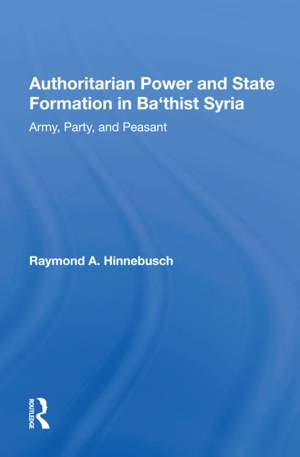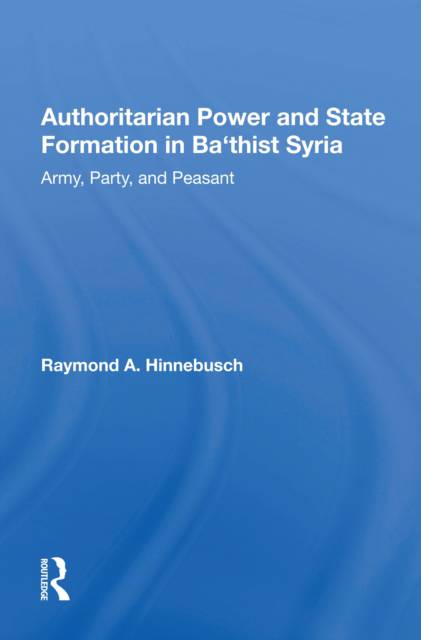
Door een staking bij bpost kan je online bestelling op dit moment iets langer onderweg zijn dan voorzien. Dringend iets nodig? Onze winkels ontvangen jou met open armen!
- Afhalen na 1 uur in een winkel met voorraad
- Gratis thuislevering in België vanaf € 30
- Ruim aanbod met 7 miljoen producten
Door een staking bij bpost kan je online bestelling op dit moment iets langer onderweg zijn dan voorzien. Dringend iets nodig? Onze winkels ontvangen jou met open armen!
- Afhalen na 1 uur in een winkel met voorraad
- Gratis thuislevering in België vanaf € 30
- Ruim aanbod met 7 miljoen producten
Zoeken
Authoritarian Power and State Formation in Ba`thist Syria
Army, Party, and Peasant
Raymond A Hinnebusch
Hardcover | Engels
€ 175,95
+ 351 punten
Omschrijving
The social and economic forces that worked together to bring the Ba'thist party to power in 1963: the failure of traditional and liberal leadership, an agrarian crisis, the development of party ideology, the politicization of the army and rural mobilization - are examined in this study. Dr Hinnebusch aims to show how the Ba'th's road to power shaped its ideology and the character of its rule. Attention is then given to the pillars of state power - the army, political organizations and the peasantry. The author concludes that the regime has pursued a dual strategy for maintaining power - placing kin and clientelist networks at the levers of coercive power and building structures based on the mass incorporation of the rural population.
Specificaties
Betrokkenen
- Auteur(s):
- Uitgeverij:
Inhoud
- Aantal bladzijden:
- 360
- Taal:
- Engels
Eigenschappen
- Productcode (EAN):
- 9780367012656
- Verschijningsdatum:
- 29/11/2021
- Uitvoering:
- Hardcover
- Formaat:
- Genaaid
- Afmetingen:
- 152 mm x 229 mm
- Gewicht:
- 452 g

Alleen bij Standaard Boekhandel
+ 351 punten op je klantenkaart van Standaard Boekhandel
Beoordelingen
We publiceren alleen reviews die voldoen aan de voorwaarden voor reviews. Bekijk onze voorwaarden voor reviews.











